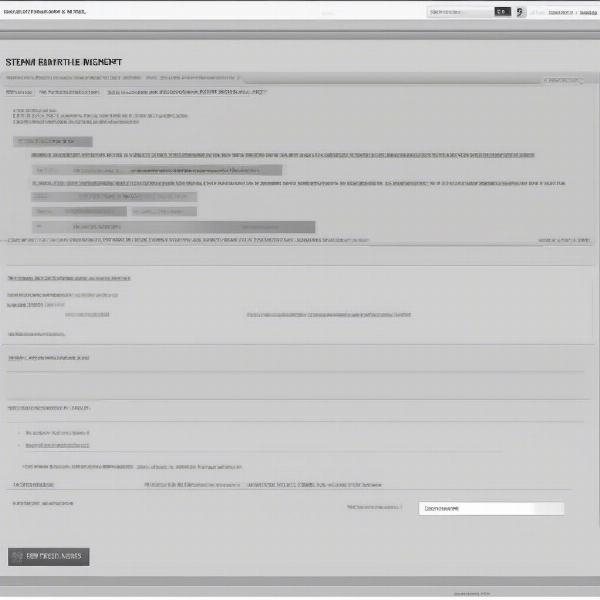Finding out when you acquired a game on Steam can be surprisingly tricky. Unlike some other platforms, Steam doesn’t readily display the purchase date on the game’s store page or in your library. However, there are a few ways to unearth this information, whether you’re curious about your gaming history, tracking your spending, or simply settling a friendly debate with your friends.
Similar to how to update the game, finding purchase dates on Steam can be a little hidden. This guide will walk you through the various methods, from the simplest to the more involved, ensuring you can pin down that elusive purchase date. So, whether you’re trying to remember when you first dived into Counter-Strike or just curious about your gaming timeline, we’ve got you covered.
Checking Your Purchase History
The most straightforward method for seeing when you got a game on Steam is to check your purchase history. This comprehensive log stores all your transactions, including game purchases, DLC, in-game items, and even wallet funds. To access it, log into your Steam account and navigate to “Account Details.” From there, click on “View purchase history.” This page lists all your purchases with dates, providing a clear record of your Steam activity. It’s a valuable tool for managing your gaming budget and understanding your spending habits.
Using SteamDB
If your purchase history doesn’t provide the level of detail you’re looking for, or you’re trying to find the purchase date of a game you received as a gift, SteamDB is a powerful resource. This third-party website acts as a massive, publicly accessible database containing a wealth of information about Steam, including game data, pricing history, and user reviews. By searching for a specific game and navigating to its store page on SteamDB, you might find more detailed information related to its release and update history. This can sometimes help you deduce the approximate timeframe of your purchase, especially if it was near a major update or release.
Contacting Steam Support
In some cases, particularly for very old purchases or if you encounter issues with your purchase history, contacting Steam Support might be necessary. While it might seem like a last resort, Steam Support can often access detailed records of your account activity, including purchase dates. Be prepared to provide as much information as possible, such as the game’s name, approximate purchase date, and any relevant transaction details. This will help them locate the specific purchase in their system.
When Did You Get That Game? Using Email Receipts
Remember those email receipts you probably archived (or maybe deleted)? They’re a goldmine of information! Each purchase on Steam generates an email receipt containing the purchase date, time, and even the payment method used. Searching your email archives for “Steam purchase” or the game’s name can help you pinpoint the exact moment you added it to your library. This is particularly useful for confirming gift purchases, as the receipt will indicate who sent the gift and when.
 Steam Email Receipt Example
Steam Email Receipt Example
Examining Your Library in Detail
While your Steam library doesn’t directly display purchase dates, it can offer some clues. Games are often sorted by recent activity, so older games tend to sink to the bottom. While this isn’t a precise method, it can help you narrow down the timeframe for your older purchases. Moreover, looking at achievements or playtime can sometimes jog your memory about when you first started playing a game, which can be a helpful starting point for further investigation. For instance, if you see that you haven’t played a game in several years, you can use that information to refine your search in your purchase history or email archives. It’s like a digital archeological dig into your gaming past!
Why Knowing Your Steam Purchase Date Matters
You might be wondering, “Why is knowing the exact date I got a game so important?” Besides satisfying your curiosity, there are practical reasons too. Knowing your purchase date can be crucial for warranty claims, refund requests, and even tracking your gaming budget. For example, if you encounter a technical issue with a game shortly after purchasing it, knowing the exact purchase date can streamline the support process. It also allows you to monitor your spending on games, which can be helpful for budgeting and managing your finances. Remember that time you thought you bought that game last year, but it was actually two years ago? Knowing your purchase dates can prevent such surprises!
Understanding Steam’s Purchase System
Steam’s purchase system is designed for seamless transactions, but it can be slightly opaque when it comes to historical data. Unlike some platforms that clearly display purchase dates, Steam prioritizes showcasing your games and providing quick access to play them. While this simplifies the user experience, it can make tracking down specific purchase information a bit more challenging. Understanding this design philosophy can help you appreciate why these alternative methods are necessary for finding your purchase dates. Think of it like a well-organized library: you see the books on the shelves, but the acquisition dates are tucked away in the librarian’s records.
Can’t Remember When You Got That Game? Check Your Bank Statements!
If all else fails, your bank or credit card statements can be a lifesaver. These statements provide a detailed record of all your transactions, including Steam purchases. Searching for “Valve” or “Steam” on your statements can reveal the exact date and amount of each purchase. While this method might require a bit more digging, it’s a reliable way to confirm your purchase history, especially for older transactions that might not be readily accessible through Steam’s interface. You might even uncover some forgotten purchases along the way!
Conclusion
Knowing How To See When You Got A Game On Steam can be incredibly useful. Whether it’s for tracking your spending, managing your library, or simply satisfying your curiosity, the methods outlined above offer a variety of approaches to pinpoint that elusive purchase date. From the simple convenience of checking your purchase history to the more in-depth exploration of SteamDB and email archives, you now have the tools to become a Steam purchase history detective. So, go forth and uncover the secrets of your gaming past! And don’t forget, managing your game updates is also an important part of the Steam experience, so be sure to check our guide on how to update the game for more helpful tips! What are you waiting for? Dive in and rediscover your gaming journey!
FAQ
-
Why can’t I see the purchase date directly in my Steam library? Steam prioritizes showcasing your games and providing easy access to play them, rather than displaying detailed purchase information directly in the library.
-
Is SteamDB a reliable source of information? Yes, SteamDB is a widely used and trusted resource for Steam-related data. However, it’s important to note that it’s a third-party website and not officially affiliated with Steam.
-
What if I can’t find my purchase email receipt? You can try contacting Steam Support or checking your bank/credit card statements for transaction records.
-
Does Steam keep a permanent record of my purchases? Yes, Steam maintains a comprehensive record of your purchase history, even for very old transactions.
-
Can I see the purchase date of games I received as gifts? Yes, you can see the date a gift was sent by checking your email receipt or by contacting Steam Support. You can also learn about other platform’s subscription service like is mortal kombat x on game pass.
-
What if I accidentally deleted my purchase history? Contacting Steam Support is the best course of action if your purchase history is missing or incomplete. They can help you retrieve the necessary information. This is similar to if you have issues with logging in and need to know how to log into epic games without email.
-
Can I track my total spending on Steam? While Steam doesn’t provide a readily available total spending figure, you can calculate it by reviewing your purchase history or bank/credit card statements. This ties into understanding how much does steam take from game sales, another crucial aspect of selling games on the platform. You may find this information regarding sales helpful if you’re a developer or considering selling your games.

